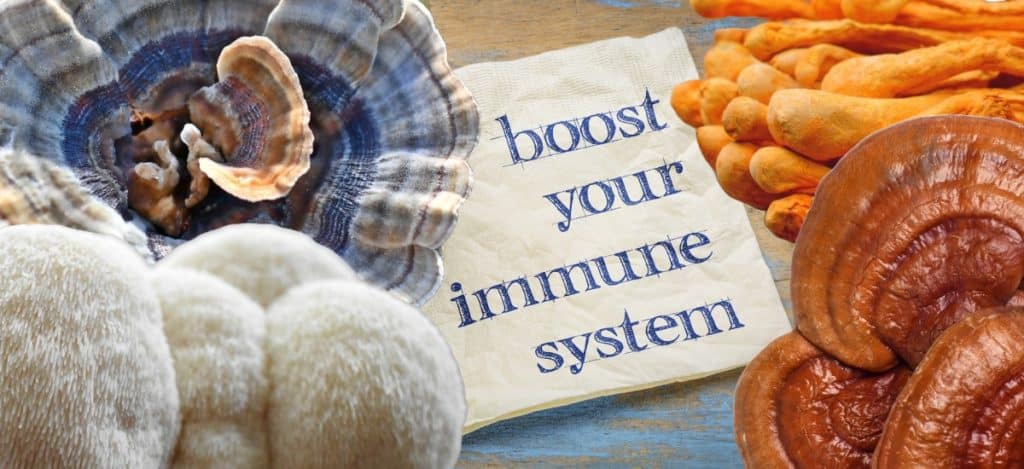Medicinal mushrooms are the focus of a lot of attention at the moment, and one of the reasons for this is their history of use in traditional medicine to support the immune system.
These adaptogenic, functional foods are packed with bioactive compounds that may help modulate immune system function, improving our overall health.
Although scientists need more clinical trials to fully understand how these compounds interact with the human immune system, animal and in vitro studies have highlighted their potential benefits.
What is the healthiest mushroom?
All medicinal mushrooms contain beneficial compounds that act in different ways to support overall health and vitality.
The best one for you depends on your individual circumstances and the health benefits you’re after. But supporting your immune system is a great place to start.
Read on to discover the best mushrooms for your immune system, how they work and how to use medicinal mushrooms for immune support.
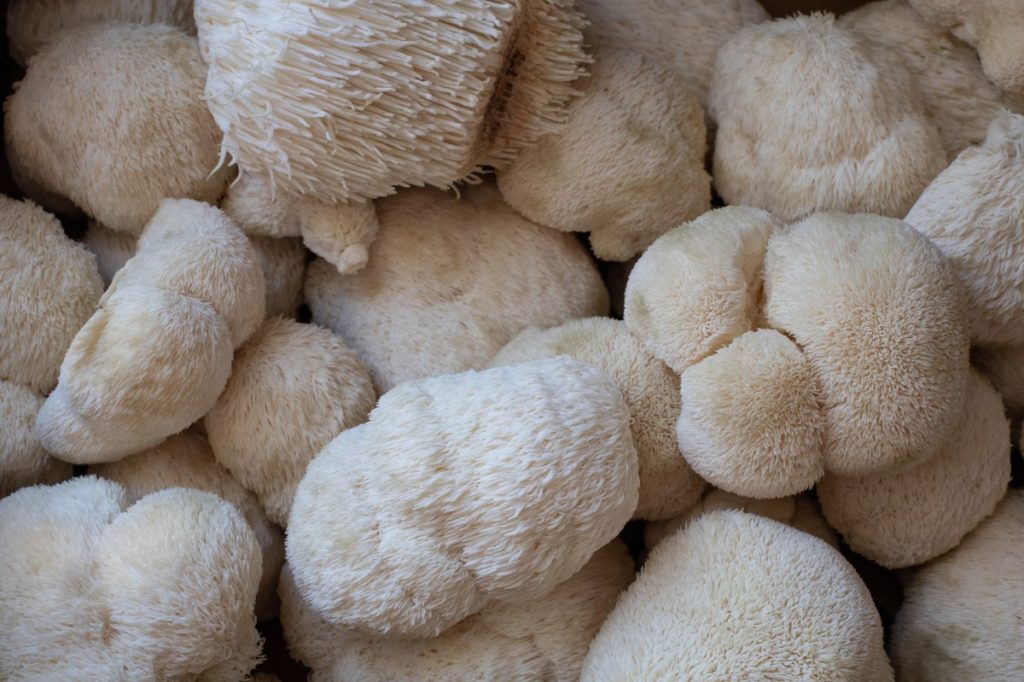
What Is the Immune System?
The immune system is a complex system of organs, white blood cells and tissues that produce proteins and chemicals to help the body fight infections and diseases.
It’s the body’s first line of defense against pathogens, and helps it heal from infections and injuries.
8 Best Mushrooms for Your Immune System
All mushrooms are nutrient-dense functional foods that offer a host of health benefits, but some stand out for their ability to support the immune system.
Here are some of the best mushrooms to use to support your immune system:
1. Turkey Tail
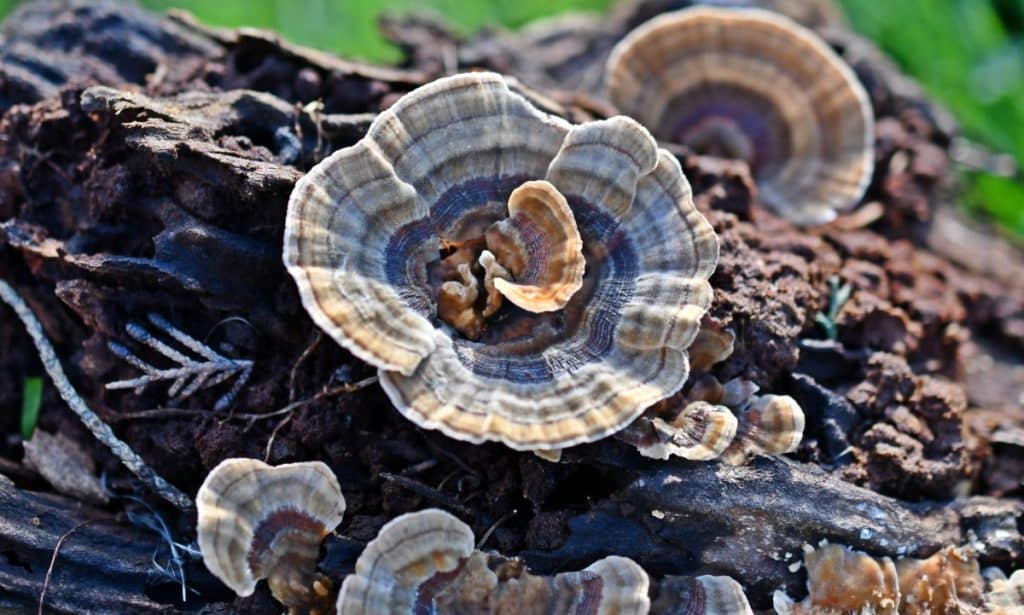
When it comes to supporting the immune system, turkey tail is usually the medicinal mushroom of choice as it contains high levels of beneficial polysaccharides that provide immunomodulatory effects.
Two of the most impressive protein-bound polysaccharides or beta-glucans in turkey tail mushrooms are Polysaccharide Krestin (PSK) and Polysaccharide Peptide (PSP).
These bioactive compounds enhance the immune system’s responses by activating or inhibiting specific immune cells and suppressing inflammation.
Studies suggest PSP has immunostimulatory effects on several types of immune cells, increasing their numbers and encouraging the production of beneficial cytokines that fight infection and boost immunity.
PSK may regulate the body’s immune response by activating T and B lymphocytes or natural killer cells that help protect the body against pathogens and cancerous tumors.
But boosting immunity is not the only health benefit these well-researched mushrooms provide.
The bioactive compounds in turkey tails also offer other health benefits are also believed to help combat cancer, provide antioxidant properties and play a role in liver and gut health.
2. Reishi
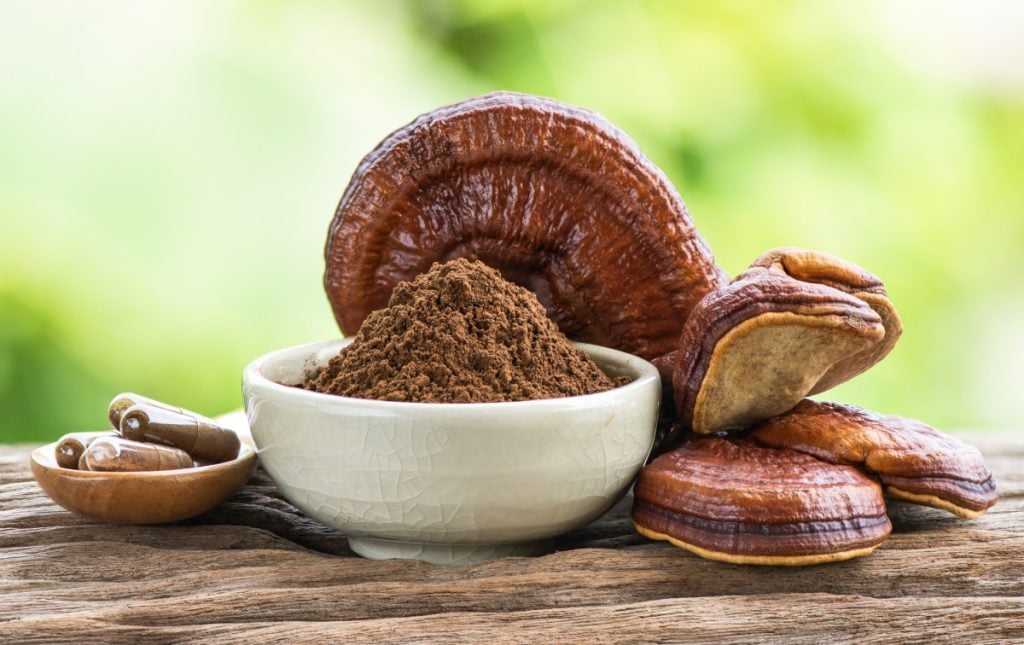
Reishi, known in China as the mushroom of immortality, is another medicinal mushroom that contains significant beta-glucans.
It’s prized by traditional healers for it’s health benefits and known for its potential to boost immunity, improve sleep and moderate the body’s response to stress.
Several in vivo and in vitro studies suggest reishi mushrooms may have extensive immunomodulating effects and promote immune organ growth and cytokine release.
Scientists believe the polysaccharides in reishi may affect immune and immune-related cells, including B and T lymphocytes, dendritic cells, macrophages, and natural killer cells.
However, they need more evidence-based clinical trials to fully understand the immunomodulating effects of reishi and its potential applications.
3. Chaga
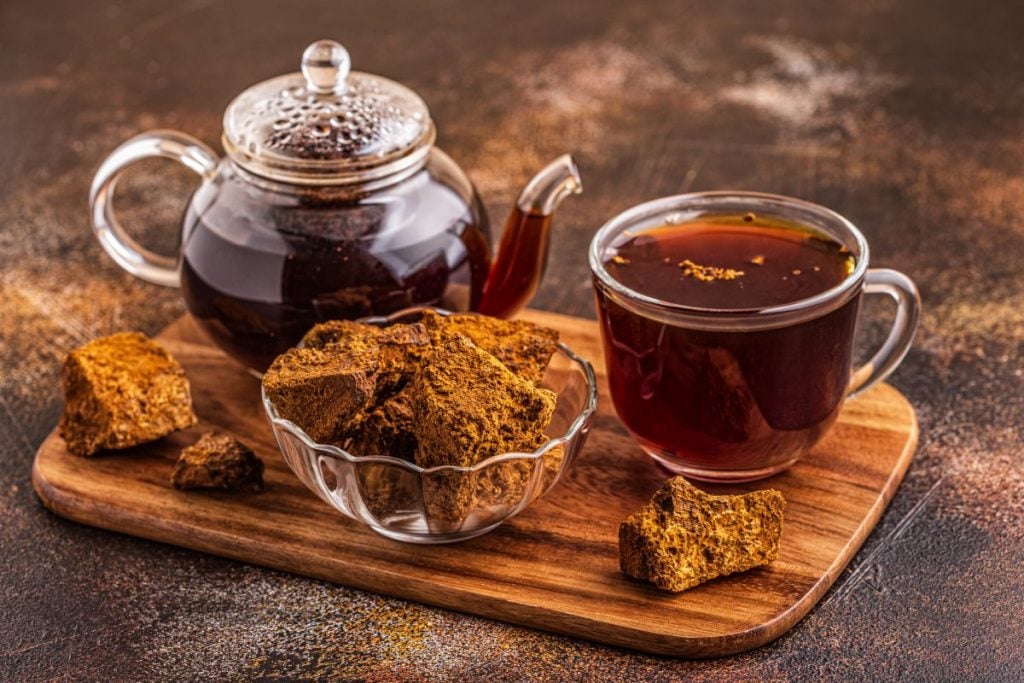
Chaga contains loads of antioxidants that provide many health benefits, and traditional healers in Europe and Russia have used this medicinal mushroom for centuries to boost the immune system and reduce inflammation.
Although research is in its early stages, studies show that the active compounds in chaga mushrooms may stimulate the immune system and help it function optimally.
A 2011 study found that chaga polysaccharides provided immunomodulatory effects by promoting the production of beneficial cytokines that enhanced the activity of immune cells.
Another study using mice highlighted chaga extracts’ potent immunomodulatory activity and suggested it increases the number of macrophages, specialized white blood cells, that surround and kill cancer cells, bacteria, or other microbes that threaten the body.
4. Cordyceps
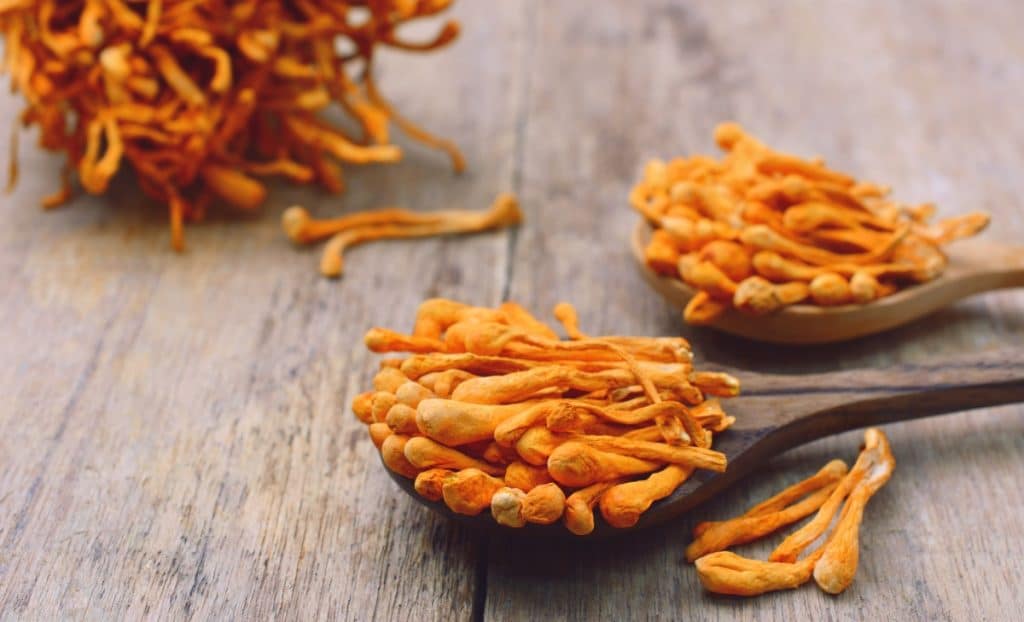
Cordyceps is a unique medicinal mushroom that traditional Chinese and Tibetan healers used to improve athletic performance, reduce inflammation, boost the immune system and help the body deal with stressors.
Several of the compounds in cordyceps are immunomodulators that help to regulate the immune system.
Research shows cordyceps may stimulate certain immune cells, like T and B cells, improving the immune system’s response to threats.
Apart from potentially boosting immunity, cordyceps may also suppress the immune system by regulating the production of macrophages and natural killer cells.
5. Lion’s Mane
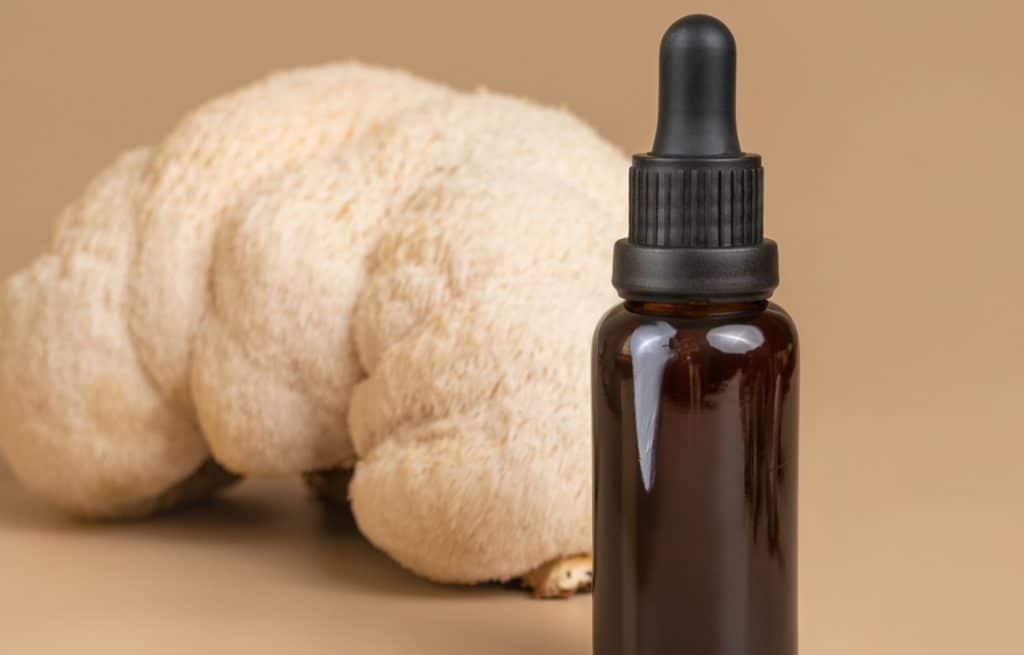
Lion’s Mane mushrooms are currently one of the most popular edible and medicinal mushrooms worldwide, reputedly providing many sought-after health benefits.
Studies show it may help improve brain function, boost the immune system, reduce inflammation, and combat anxiety & depression.
The immune system and inflammation are very closely linked, and if there is a problem in our body, the immune system initiates an inflammatory response to address the issue.
However, internal and external stressors can cause ongoing chronic inflammation that often leads to debilitating health conditions like rheumatoid arthritis, lupus, psoriasis, MS and IBD.
A 2010 study suggests that lion’s mane may assist the immune system by regulating the signaling in the body’s inflammatory pathways, thus decreasing the inflammatory response.
But helping to prevent chronic inflammation is not the only way lion’s mane helps to boost the immune system.
Animal studies suggest the polysaccharides in lion’s mane may help to regulate the gut microbiome and boost the activity of the intestinal immune system.
This system helps to protect the body from pathogens that enter the gut through the mouth or nose and significantly affects overall well-being.
If you live in the UK and are looking for a high-quality lion’s mane supplement, check out our list of 10 of the best lion’s mane supplements in the UK.
6. Maitake
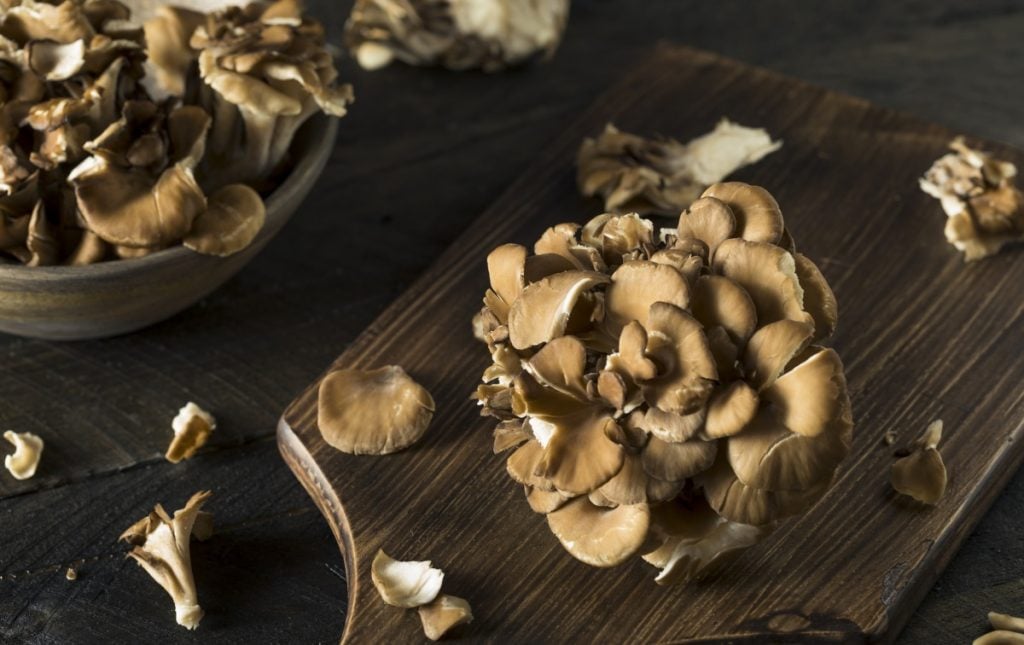
Maitake mushrooms are delicious edible mushrooms rich in bioactive compounds, particularly beta-glucans, that are known to positively impact the immune system.
Several types of beta-glucan polysaccharides stimulate immune responses in the body by activating different immune cells.
Maitake mushrooms contain a specific type of protein-bound polysaccharide called D-fraction that is very effective at stimulating immune response.
In an animal study investigating the immune-boosting properties of maitake mushrooms, researchers concluded that maitakes may help the body fight off foreign pathogens, providing protection against infectious diseases.
Maitake mushrooms also provide other health benefits, including helping fight cancer, supporting weight management, contributing to heart health and aiding gut wellness.
7. Shiitake
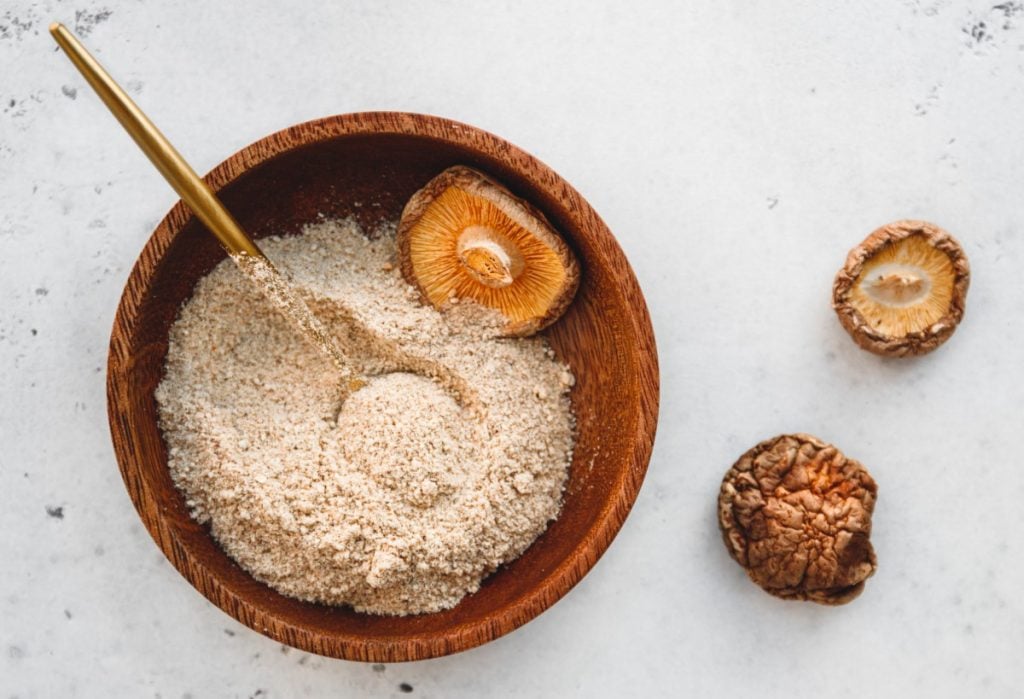
Shiitake mushrooms are one of the most cultivated mushroom species worldwide. They’re both edible and medicinal, with a history of use in traditional medicine that goes back thousands of years.
Like other medicinal mushrooms, shiitakes contain loads of bioactive polysaccharides that may enhance immune response, helping the immune system fend off diseases.
But, the polysaccharides in shiitake mushrooms are not the only compounds that support the immune system. Many of the immune-boosting effects may come from their zinc content.
Shiitakes are a great source of zinc, a mineral essential for the immune system that helps the body fight infections and oxidative stress, preventing the onset of many age-related diseases.
8. Oyster Mushrooms
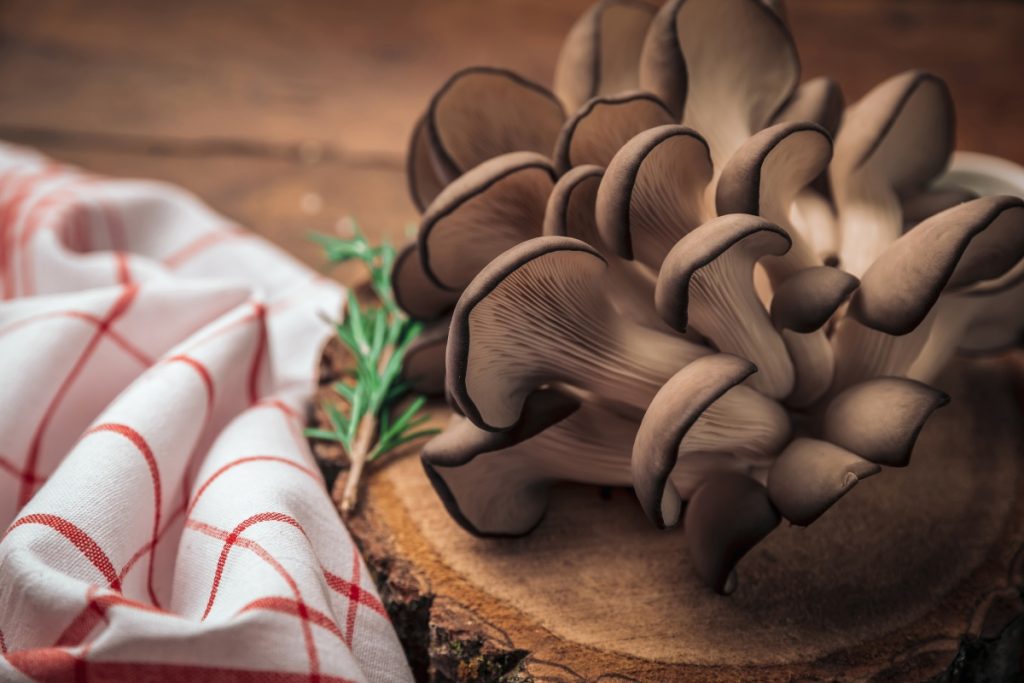
Oyster mushrooms are popular gourmet mushrooms and one of the easiest species to grow at home.
Although they’re not usually labeled as medicinal mushrooms, like many other gourmet mushrooms, they’re nutrient-dense functional foods with many health benefits, including immune-boosting properties.
Oyster mushrooms contain many bioactive compounds, including significant amounts of beta-glucans that are potentially direct activators of the immune system.
A 2015 clinical study to test the effects of oyster mushroom extract on immune reaction demonstrated that it up-regulates the immune system by increasing the production of white blood cells and may be a promising candidate for the prevention of diseases.
How Mushrooms Support the Immune System
Mushrooms contain so many beneficial compounds that contribute to our health and well-being that many consider them superfoods.
Some of the active compounds, vitamins and minerals in mushrooms directly affect the immune system. Others provide support for other systems and organs and, in doing so, also benefit the immune system.
Here are some of the ways mushrooms support the immune system:
Activate Immune Cells
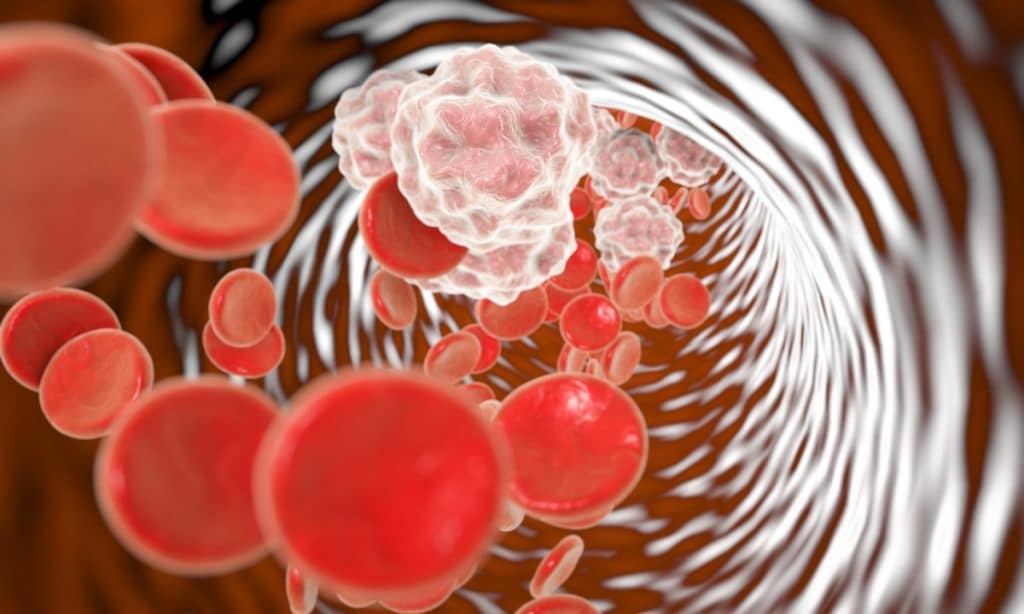
Mushrooms contain many bioactive polysaccharides, but one of the most beneficial when it comes to activating immune cells is beta-glucans.
Beta-glucans are primarily found in the mushroom’s chitin cell walls, and mushroom stalks generally contain more beta-glucans than the caps.
Humans have specialized white blood cells, like macrophages, monocytes and neutrophils, that have receptor sites that bind with polysaccharides like beta-glucans, and when they do, it activates them.
When activated, they engulf and destroy viruses, bacteria and tumor cells. Macrophages also analyze threats and release cytokines that stimulate other white blood cells.
As the amount of beta-glucans in mushrooms varies from species to species, scientists have screened several species to discover their beta-glucan content.
Here, ordered from highest to lowest, is the beta-glucan content of the eight mushrooms above:
- Turkey tail – 60.8g of b-Glucans per 100g dried mushroom
- Lion’s mane – 35.3g of b-Glucans per 100g dried mushroom
- Maitake – 26g of b-Glucans per 100g dried mushroom
- Oyster – 24g of b-Glucans per 100g dried mushroom
- Reishi – 23.6g of b-Glucans per 100g dried mushroom
- Shiitake – 19.7g of b-glucans per 100g dried mushroom cap and 25.3g of b-glucans per 100g dried mushroom stem
- Chaga – 8.5g of b-Glucans per 100g dried mushroom
- Cordyceps – 3.79g of b-Glucans per 100g dried mushroom
Reduce The Effects of Stress

Many mushrooms are adaptogens, which means they contain compounds that help the body adapt and reduce the effects of stress on the body.
When it comes to mushrooms, the terms medicinal and adaptogenic don’t mean the same thing.
A mushroom may have medicinal effects, including anti-inflammatory and immune-stimulating properties, but won’t necessarily be adaptogenic.
The term adaptogenic, specifically refers to whether a mushroom contains beneficial stress-supporting compounds that affect the body’s response to stress.
Some of the most well-known adaptogenic mushrooms are:
- Chaga
- Reishi
- Lion’s mane
- Turkey tail
- Maitake
- Shiitake
Adaptogens can regulate several systems, including the endocrine, nervous, immune, digestive, and cardiovascular systems, to help the body adapt and restore balance.
Adaptogens act as immunomodulators and may stimulate an underactive immune system or suppress extreme immune responses, depending on the body’s needs.
By reducing the impact of stress on the immune system, adaptogenic mushrooms help enhance immune function.
Reduce Inflammation

The immune system and inflammation are very closely linked, and ongoing chronic inflammation can negatively impact the immune system.
If there is a problem in the body, immune cells like macrophages and monocytes secrete inflammatory mediators that cause a physical reaction to address the issue.
In normal circumstances, inflammation levels drop once the body solves the problem. However, internal and external stressors sometimes cause uncontrolled production of inflammatory mediators, leading to chronic inflammation.
Fortunately, mushrooms may be able to help with this.
Research shows that several of the bioactive compounds in mushrooms, including peptides, polysaccharides, terpenes, sterols, fatty acids, and phenols, may have modulatory effects on the body’s inflammatory signaling pathways.
They work by reducing the signaling in inflammatory pathways, inhibiting the production of pro-inflammatory mediators and decreasing that body’s inflammatory response.
In doing so, they may help the immune system function optimally and prevent ongoing chronic inflammation.
Combat Oxidative Stress

Many mushrooms are high in antioxidants that help neutralize harmful free radicals and combat oxidative stress in the body.
Free radicals are unstable molecules that damage the body’s cells. They’re a bi-product of normal metabolic functions and are also caused by environmental toxins, including cigarette smoke, exhaust fumes and other chemicals.
Many mushrooms are an excellent source of vitamins and contain ergothioneine and glutathione, two potent antioxidants.
The ability of antioxidants to destroy free radicals helps protect the structural integrity of cells and tissues, increasing their defense systems and boosting certain immune responses.
Antioxidants also help prevent oxidative stress, resulting from an imbalance between free radicals and antioxidants in your body.
Modulate the Gut Microbiome

Beta-glucans are a special type of soluble dietary fiber found in a mushroom’s cell wall that dissolves in water to form a thick, indigestible, gel-like substance.
As it travels through the gastrointestinal tract, this substance acts as a prebiotic for beneficial gut bacteria and helps maintain a diverse and balanced gut microbiome.
Immune cells interact with the organisms in the gut microbiota, and a healthy microbiome helps to reduce inflammatory responses and boost the immune system.
Wild Mushrooms With Immune Boosting Properties
It’s not only cultivated mushrooms that help to boost our immune systems; many popular wild, edible mushrooms also contain high levels of beta-glucans and other beneficial compounds.
However, these mushrooms are often challenging, if not impossible, to cultivate and sometimes unavailable as foragers have to collect them seasonally in the wild.
Here are some examples of wild edible mushrooms with lots of immune-boosting beta glucans:
- Chicken of the woods – 47g of b-Glucans per 100g dried mushroom
- Chanterelle – 23.6g of b-Glucans per 100g dried cap and 26.9g of b-Glucans per 100g dried stem
- Porcini – 16.9g of b-Glucans per 100g dried cap and 57.9g of b-Glucans per 100g dried stem
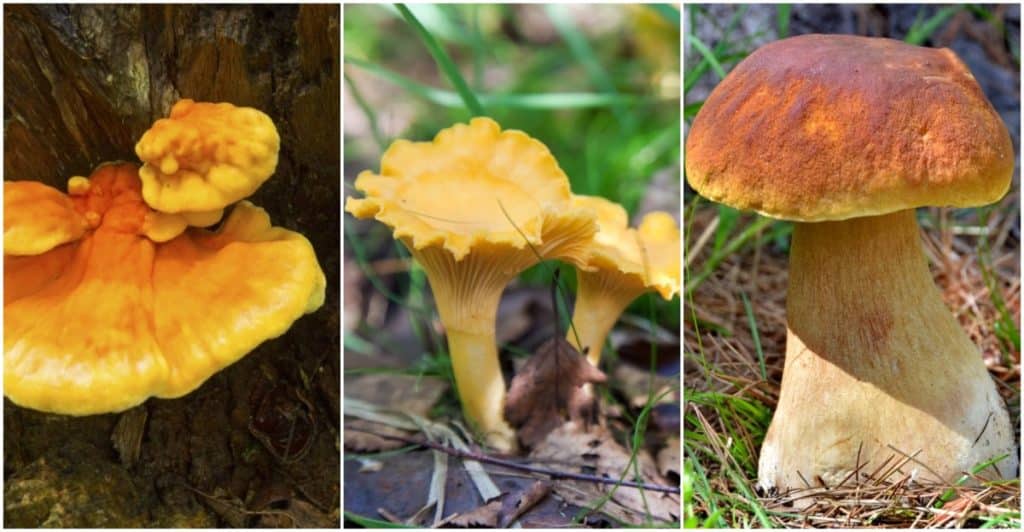
How To Use Mushrooms for Immune Support
Some of the mushrooms that provide immune support are delicious edible mushrooms, including oyster, maitake, shiitake and lion’s mane mushrooms.
These gourmet mushrooms will add nutrients and rich umami flavor to your meals if you use them fresh, but unfortunately, you won’t access all their beneficial compounds.
To enjoy the immune-boosting benefits of beta-glucans, you first need to break down the mushrooms’ chitin cell walls using hot water extraction.
This releases the beta-glucans and other water-soluble compounds contained in the mushrooms’ cell walls, making them more bioavailable.
Hot water or dual extraction mushroom powders, capsules and tinctures are the best way to access the immune-boosting benefits of functional mushrooms.
Our article, “Mushroom Tinctures vs. Extracts vs. Powders vs. Capsules,” has more information on these products and how to choose which is best for you.
FAQ About Immune Supporting Mushrooms
In our modern, often busy lives, immune support is more crucial than ever, and functional mushrooms may be able to assist.
Although traditional healers in the Far East have used mushrooms to support the immune system for thousands of years, they’ve only recently become popular in the West, and people searching for immune-boosting solutions often have questions, including:
Do reishi mushrooms help the immune system?
Animal and in vitro studies suggest that reishi mushrooms may help stimulate and modulate the immune system by activating white blood cells and suppressing the inflammatory pathways in the body.
Is reishi or chaga better for the immune system?
Reishi and chaga are both adaptogenic mushrooms that support the immune system but work slightly differently. Reishi has higher levels of beta-glucans than chaga, but chaga has more anti-inflammatory compounds.
Which is best will vary from person to person depending on individual circumstances, but as they both help, why choose?
You can always take both, and many extract blends contain reishi and chaga along with turkey tail and lion’s mane for potent immune system support.
Final Thoughts
Studies suggest medicinal mushroom extracts contain potent bioactive compounds that may activate immune cells and modulate inflammatory pathways in the body.
Traditional healers have used them for thousands of years to support the immune system, and modern science is beginning to understand why.
To maximize the benefits, always buy your mushroom extracts from a reputable supplier that uses organic fruiting bodies and the dual extraction method to create the best product possible.
If you live in the UK, we invite you to try one of our high-strength, organically-certified mushroom extracts to boost your immune system and improve your health.
